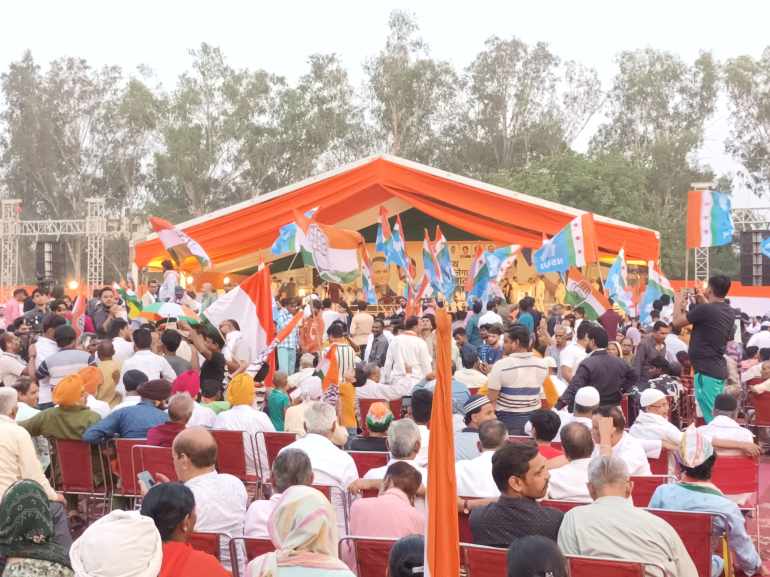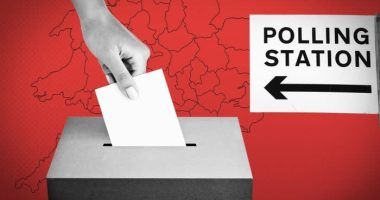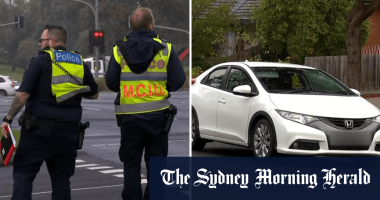New Delhi, India – On a sweltering afternoon, hundreds of men and women gathered in an open area, bigger than a football stadium, near the Yamuna river in northeast Delhi.
As the crowd grew, the place erupted into a dome of dust. People covered their faces with cotton towels and stoles, as they headed towards a makeshift tent passing through layers of security checks. They were there to see India’s Prime Minister Narendra Modi, seeking a third term in the ongoing general elections, who would soon address a public gathering.
Azaad, who identifies only by his first name, was among the teeming audience cheering for Modi. Asked about his reason for his support, Azaad, cited the popularity of the prime minister and quickly added the benefits of his flagship schemes – 5 kilogrammes of free food rations for poor families, medical insurance of up to 500,000 rupees ($6,000) and easier access to a cooking gas connection.
But Azaad, who belongs to the historically disadvantaged Balmiki caste – which is associated with sanitation work under India’s complex caste system – also introspected on his unfulfilled aspirations from the past decade of Modi’s rule.
“I wanted to buy a motorbike and start a small grocery shop. But I have not been able to do any of that because of financial constraints,” he said blaming unemployment and inflation. Azaad is a sanitation worker with Delhi’s municipal corporation.
Then, as Modi’s chopper appeared in the sky, Azaad joined a group of men hailing the Hindu deity Ram in unison, chanting slogans associated with the PM’s Bharatiya Janata Party (BJP), those disappointments were seemingly forgotten.
As Delhi votes on May 25 in the penultimate phase of the Indian elections, it is that loyalty of supporters like Azaad that is on test. The national capital has only seven parliamentary seats but its significance far exceeds that as the “political power centre of India”, said Tanvir Aeijaz, associate professor in the department of political science at Ramjas College at the University of Delhi.
And for the BJP, those seven seats have long served as a bellwether of its national prospects. Even before the party came to power nationally, Delhi served as a stronghold for the Hindu majoritarian BJP. Since 1989, the party has only failed to win a majority of the city’s parliamentary seats twice – in 2004 and 2009. On both those occasions, the party also lost overall nationally.
![Supporters of Congress leader Rahul Gandhi wait for him to arrive for a campaign rally in New Delhi, India [Abhishek Dey/Al Jazeera]](https://www.aljazeera.com/wp-content/uploads/2024/05/Rahul-Gandhi-rally-1716517806.jpg?w=770&resize=770%2C578)
The opponents
On the same Saturday, a week before Delhi’s vote that Azaad was cheering for Modi, another group of voters manoeuvred through blocks of neatly arranged chairs 16km (10 miles) away, in a gathering at a playground in northwest Delhi’s Ashok Vihar.
The people there were waiting to see Rahul Gandhi, the great-grandson of India’s first prime minister, Jawaharlal Nehru, and the top leader of the Congress party, India’s principal opposition party.
Zikr Ullah, an Urdu teacher in his mid-30s, said he was aghast at rising religious polarisation in the country and criticised Modi and the BJP for allegedly contributing to the faith-based divide, citing some of the PM’s recent comments, seemingly targeting the Muslim community during his election campaign.
“It is impossible for the BJP to win seats in Delhi this time. There is massive anger among people over unemployment and inflation. Their lives have not improved in the last 10 years,” said Ullah on Saturday.
The next morning, Arjun Singh Meena, a farmer from Vidisha, a district in central India’s Madhya Pradesh, arrived in Delhi and walked straight to the Aam Aadmi Party’s (AAP) head office near the city’s centre. The AAP, which is part of the Congress-led national opposition alliance known as INDIA, rules the city-state of Delhi.
Meena said he was upset over the crackdown on opposition leaders by central agencies under the Modi government ahead of the elections. “This is not the way a country should be run. Everyone deserves a level playing field,” he said.
Meena was there to support Delhi chief minister and AAP supremo Arvind Kejriwal, an anticorruption activist-turned-politician, who was the latest among opposition leaders to be jailed – on March 21.
Kejriwal has been accused of corruption in a liquor policy-related case by India’s top federal investigative agency for financial crimes. He denies those allegations – the AAP and the INDIA alliance accuse the BJP of a witch-hunt against them. On May 10, India’s Supreme Court granted Kejriwal temporary bail to allow him to campaign in the election. He has to surrender and return to jail on June 2, a day after the final phase of India’s elections.
Over the past decade, AAP has been a dominant force in Delhi’s electoral playfield. It won 28 out of 70 state legislature seats in the 2013 elections, then almost swept the state elections in 2015 and 2020, winning more than 60 seats each time. Yet in this period, it has failed to win even one national parliament seat from Delhi, with the BJP sweeping all seven seats in 2014 and 2019, riding on the back of Modi’s popularity.
That phenomenon – of Indian voters thinking differently about whom to choose to govern their state and nation – is not unique to Delhi. But in 2024, both the AAP and the Congress say there’s a difference: In 2014 and 2019, the two parties fought against each other as well as against the BJP in a triangular contest.
This time, they’re allied together, with AAP contesting four of Delhi’s seats, and the Congress the remaining three.
![Arjun Meena, a farmer from the central Indian state of Madhya Pradesh, who has come to Delhi to join the campaign of the Aam Admi Party [Abhishek Dey/Al Jazeera]](https://www.aljazeera.com/wp-content/uploads/2024/05/Arjun-Meena-1716517875.jpg?w=770&resize=770%2C578)
A different contest
That consolidated fight against the BJP means that “the opposition votes will no longer be divided”, said Shama Mohamed, national spokesperson of the Congress.
“Also, we can see an anti-incumbency factor across India for unemployment, inflation and several other factors. Delhi is no exception to that,” she said. “People have now witnessed how BJP is killing democracy,” she added, referring to the opposition allegation that the ruling party has subverted independent institutions into subsidiaries of its governance while cracking down on critics – charges that the BJP denies.
Delhi has more than 14.72 million voters who come from a wide range of backgrounds. In upscale localities such as Defence Colony, Golf Links, Vasant Vihar, New Friends Colony and Niti Bagh, the city’s elite hobnob in exclusive clubs. The city is also home to more than 1,800 unauthorised settlements and thousands of small and big slums that house two-thirds of Delhi’s population.
Finally, there is also the city’s central region, with well-maintained wide avenues shaded by leafy trees, where politicians, bureaucrats, judges and some top industrialists live in colonial-era bungalows.
What happens in Delhi has an outsized echo beyond the city, said Aeijaz, the associate professor. “It’s not just a symbolic thing. Lawmakers elected from Delhi get to stay in close proximity to the union government and make political connections,” he said.
The city’s influence as a weathervane of national sentiment also stems from its status as a melting pot of people from all over the country. Delhi has the second-highest population of inter-state migrants in India, second only to Maharashtra, according to 2011 census data on migration released in 2019. More than 6.3 million Delhi residents – which is nearly 40 percent of its 2011 census population of around 16 million – were migrants from other states, of which around two million were recorded to have migrated for work. A large chunk of them have turned into voters in Delhi over time, say leaders of both the BJP and AAP.
Sandeep Pathak – a close aide to Kejriwal who is also a member of parliament in India’s upper house, the Rajya Sabha – shares Congress spokesperson Mohamed’s optimism that change is afoot. Kejriwal’s arrest and subsequent release on bail have galvanised the party and opposition alliance, he said.
The party, he said, has also stressed in its campaign on its governance model in Delhi, which has focused on welfare schemes aimed at improving government-run schools and public healthcare, free electricity and water for the poor, and free bus rides for women. The party also rules the northern state of Punjab.
“There is no greater danger to the country than the Modi government and the BJP. Our aim is to defeat them in India and in its capital. We have to burst this whole bubble of lies of Narendra Modi. We are also trying to propagate the positive and constructive nature of politics that we believe in,” Pathak said.
But BJP leaders say they’re convinced Delhi will stick with their party. In 2019, the party won 57 percent of the city’s votes. This year, the BJP dropped six out of their seven MPs, giving new faces a chance to contest, in a bid to avoid any anti-incumbency.
And for the talk of a united opposition, RP Singh, national spokesperson of the BJP, pointed to dissent within sections of the Congress over teaming up with AAP to suggest that the INDIA bloc faces internal fissures.
“When it comes to AAP, I have one question: Who would vote for a person who was jailed for a scam and is out on bail? No one,” he said. This time, Singh predicted, the BJP would win not just the city’s seven seats but more than 60 percent of votes on June 4, when results are announced.
If it does, history and legacy suggest that the BJP might well be smiling nationally, too.
Read More: World News | Entertainment News | Celeb News
Aljazera







